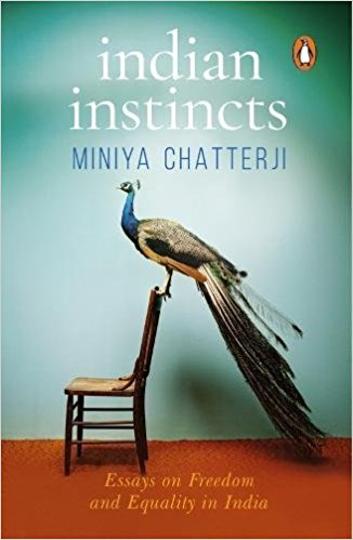If you were to do a PET scan of my brain right now, you’d see a chaos of colours. That’s because I’ve just finished reading Indian Instincts: Essays on Freedom and Equality in India by Miniya Chatterji, and the way the author has analysed the issues that make every generation of Indian sputter and fume, comprehensively and coherently using history, philosophy, current affairs, world affairs and her own observations, has lighted up every part of my mind. In fact, it wouldn’t be going too far to say I feel almost high with all that information ricocheting around my brain: some people need LSD for their mind trips; I seem to have just needed this book.
Indian Instincts comprises 15 essays on various realities of Indian life, ranging from love, sex, and parenting, to nationalism, religion, corruption, freedom of speech, corporate life, democracy, and individual freedom: each one a contentious subject on its own, each one a problem that will apparently go away only if India had a restart button like my computer, and perhaps not even then.
Because according to Indian Instincts, beneath all our troubles, from parenting to communal violence to nearly institutionalised corruption, lies one fact: “…that we are willingly entrapped in the institutions of our own making, having abandoned the rationality to realize that we have lost sight of the reasons these institutions were set up in the first place.”
The institutions Chatterji refers to include the government, the corporations we work for, and religion among others. All these collectives were loosely set up millennia ago to allow individual human beings the freedom to do their own thing while cooperatively taking care of responsibilities, she says. But all have now taken over our lives in such massive proportions that we literally do not know how to function as individuals any more. And not only can’t we think our way out of this tangle, we don’t even want to.
We can’t think our way out of it for the simple reason that what passes for education in this country does not allow us to ask questions; it only provides us with answers to learn by rote, Chatterji says in the essay titled ‘Corporations’. This means that we are never given the opportunity to exercise and practice our reasoning powers. We don’t want to think our way out of it because exercising our reasoning powers would fill us with despair. Any individual trying to function in an ethical, rational manner in India is compelled to engage with the various forces of corruption anyway, because, as Chatterji says in the essay titled ‘Values’, corruption is by now almost an institution in itself.
Behind all this, says Chatterji in almost every essay, is the basic fact that a lot of people have a lot to win from inequality. Business and industry would certainly not be as profitable as it is without the benefit of cheap labour. Likewise, government, political parties and religion would be much less powerful without large numbers of people desperately scrambling for the same meagre resources. Too many people have too much to lose to actually work towards equality by setting up an education system that teaches all of us to think, and establishing best practises that would actually allow citizens easy and simple access to resources.
In turn, this means that few people in the country have individual liberties: a starving man, for instance, cannot choose to fast. Fasting is already imposed upon him. And a woman from a poor background cannot afford to take a few days off after giving birth, leave alone the six month maternity leave guaranteed by the government. No work means no money means no food means no choices means no freedom, all of which come from no equality.
You could say that this is not the first time that someone in this apparently independent thought-deprived country has pointed out the same issues that Chatterji has – and certainly she’s quoted many people to back her arguments. You could also say that you’ve heard all this before – and you certainly have, in reams of newsprint. Not much of anything I read in Indian Instincts was new to me. What was new, however, was the juxtaposition of the facts that Chatterji used to back her arguments.
This doesn’t mean that I agree with everything Chatterji says. In the essay titled ‘Decibels’, she argues that colonialism clamped the western ideal of an orderly life onto a country whose people were unashamed of being emotional, thus leading to inhibitions about what is expressible and what is not. In my opinion, the people of this country suffer from not enough behavioural inhibitions. A few more emotional inhibitions among more people would give us all some peace and quiet.
But peace is not the outcome I believe Chatterji is hoping for with this book; not the peace of complacency at any rate. Rather, she argues for a return of arguments in India: not the ‘whose painting is more offensive’ kind of arguments, but arguments that will open minds and hearts, and then lead to the changes India needs.
Kushalrani Gulab is an independent journalist.



Leave a reply